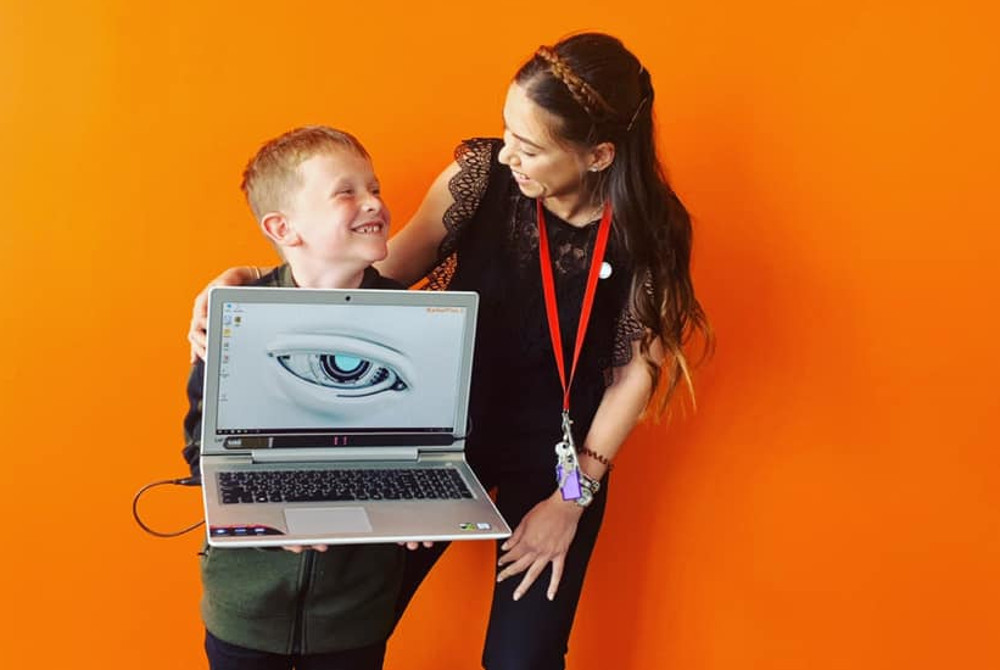RADAR’s Defeat Dyslexia Early Screening Platform Launches at Scale in Greece
€500000 in government funds for early dyslexia screening to aid 1500 children on Crete
HERAKLION, June 11, 2019 -- RADAR an innovative, non-invasive screening platform developed by RADARMISSION Ltd™ to identify children at high risk of dyslexia and related reading disorders, will deploy its first at scale neurobiological testing program, “Defeat Dyslexia” on Crete, Greece. The initiative, conducted in cooperation with the Hellenic Mediterranean University and the Region of Crete will receive €500000 Euro in funding approved by Crete’s Governor Stavros Arnaoutakis, and will initially target 1500 children, and eventually all the children on the island.
"Here on Crete, we are addressing many pressing concerns including infrastructure modernization, efforts at sustainability, and job creation, but none is more crucial than ensuring the future for our children's,” the governor said. “We believe this cooperation with Dr. Aslanides and his RADAR team will help eliminate a huge hurdle that might otherwise affect many of our schoolchildren," he continued.
The study will run at the RADAR Emmetropia Eye Institute headquarters under the direct supervision of the Hellenic Mediterranean University alongside the interdisciplinary team led by one of the world’s most prominent ophthalmologists, Dr. Ioannis Aslanides. The epidemiological study is the first of its kind where doctors, speech therapists, informatics specialists, and social workers monitor the prevalence of dyslexia and reading abnormalities. This digital diagnostic approach will lay the foundation for digital-based customized treatments for the first time, as well.
With more than 4000 experiments completed and ongoing evaluation studies at Harvard University in the United States and Cardiff Metropolitan University in the United Kingdom, the RADAR method of screening is the first-ever objective and quantifiable early screening method for dyslexia.
“When we first began developing RADAR a decade ago, the mission was to defeat dyslexia and the horrible effects the anomaly exacts on so many,” said Dr. Aslanides. “Now, with the help of some of the world’s most dedicated engineers, doctors, educators, and willing leaders, we are inches away from winning a major battle against learning disorders,” he added.
RADAR uses eye tracking parameter measurements with high discriminative power, as indicated by ROC (receiver operating characteristic) curves and obtained during silent text reading. These are combined to derive a total reading score (TRS) that can reliably separate readers with dyslexia from typical readers. The deployment of “Defeat Dyslexia” on Crete is an opportunity for the researchers to refine the RADAR platform and to create customized therapies as indicated by the results. Dr. Aslanides says this is the first broad-based deployment of such a tool, and the only case in which speech pathologists, social workers, and ophthalmologists work together to scrutinize the screening effort.
Experts in the field estimate that about 15% to 20% of the world’s population suffers from some form of dyslexia or related reading disorders - but most are never diagnosed. The implications for very early quantifiable screening of children are tremendous. Dyslexics have trouble identifying words, spelling, writing, reading aloud, and even solving math problems. While it cannot be cured, early diagnosis and proper therapies will help students reach their full potential outside the world of reading. The steps taken to screen all the children on Crete will provide a model for creating a new diagnostic and customized therapeutic process educators and health professionals can deploy safely and efficiently in schools and health institutions.
About RADAR:
RADAR, which is an acronym for “Rapid Assessment for Dyslexia and Abnormalities in Reading” is a groundbreaking screening system developed by Dr. Aslanides. It is a novel, fast, objective, non-invasive method, which screens for features associated with the aberrant visual scanning of reading text seen in dyslexia and related disorders. The system, which relies on advanced algorithms combined with a simple reading test, is easy to implement at low cost, making it appropriate for large-scale screening of children aged 8 to 14, and it can also be deployed for patients all over the world, regardless of their age.
About RADARMISSION Ltd™
RADARMISSION Ltd™ is an eye-tracking-based company founded by Dr. Ioannis Aslanides, MD, PhD, F.R.C.Ophth, MBA who is the Medical Director of Emmetropia Eye Institute, one of the top eye-surgery centers in Greece. It specializes in applications of eye tracking technology, with a focus on dyslexia and reading disabilities. It has pioneered eye tracking research in South Eastern Europe and holds multiple patents for both eye tracking hardware and medical software. As a leader in its field, it has conducted several research studies and trials in the field of learning difficulties and dyslexia over the last 10 years. Its current research partners include, among others, Harvard University, USA and Cardiff Metropolitan University, UK. The company routinely organizes events in Europe raising awareness for dyslexia and learning difficulties and promoting a more informed stance against these disorders.
Press release distributed by Pressat on behalf of RADAR Emmetropia-Emmetrolexia, on Monday 17 June, 2019. For more information subscribe and follow https://pressat.co.uk/
Dyslexia Childhood Education Reading Special Education Reading Disorders Diagnostic Tools Reading Technology Education Technology Children & Teenagers Education & Human Resources Health
Published By

+30 695 514 0313
pr@radarmission.com
https://emmetrolexia.gr/en/
Vassilis Andreadakis
+30 2810-226-198
andreadakis@radarmission.com
Visit Newsroom
You just read:
RADAR’s Defeat Dyslexia Early Screening Platform Launches at Scale in Greece
News from this source:


